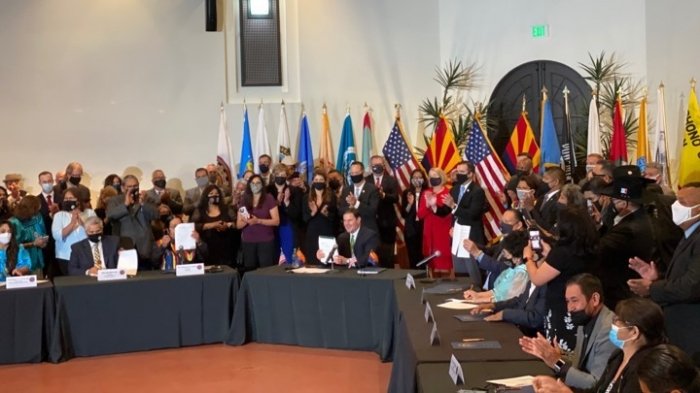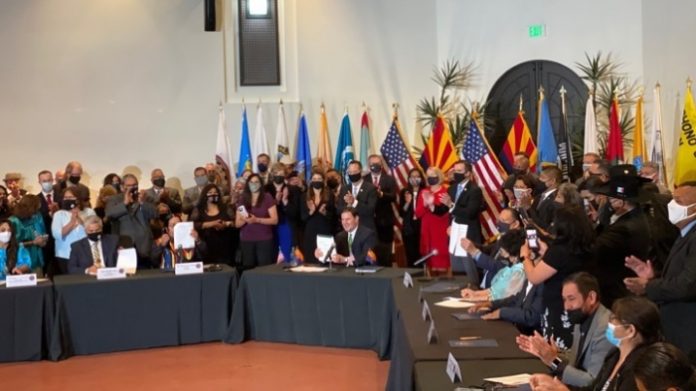
T
onto Apache and Quechan Tribes are seeking to block a lawsuit by a third tribe that threatens the launch of mobile sports betting in Arizona.
Last week, the Yavapai Prescott Indian tribeasked the Maricopa County Superior Court to halt implementation of new legislation (HB 2722) that grants sports betting licenses to ten professional sports franchises and ten tribes, which would allow licensees to begin accepting sports betting wagers on September 9. It also seeks to void an amended gaming compact negotiated by Governor Doug Ducey and 20 of Arizona’s 22 federally recognized Indian tribes, including Tonto Apache and Quechan tribes.
On Monday September 6, a judge will conduct a hearing on the Yavapai tribe’s request for a temporary restraining order and injunction blocking HB 2722. The Tonto and Quechan tribes have filed a notice of intent to intervene in the legal action, and will also pursue a motion to dismiss as needed.
The amended compact, which was approved by the U.S. Department of the Interior, and took effect in May, allows the tribes to expand their casinos and offer new table games like roulette, baccarat and craps.
The Yavapai Prescott claims that the legislation is unconstitutional and says it will be “unfairly disadvantaged” by the expansion of new wagering opportunities authorized by the law and the amended compact. It argues that the launch of sports betting should be delayed, so the courts can rule on whether the law works with the Arizona constitution.
According to an official statement, the tribe’s leaders chose not to participate in negotiations with the state and are pursuing “a desperate, 11th hour strategy that would unfairly penalize tribes that played by the rules and adhered to the terms and conditions”.
In an official press release, Tonto Apache Chairman Calvin Johnson said: “The truth is that we spent five years in painstaking, good-faith negotiations with the Governor and the Department of Gaming to protect our interests and ensure that our amended compact provides the best possible economic benefits for our people”.
“We sought to engage Yavapai leaders in developing strategies that would benefit small, like-minded tribes like ours, but they declined, saying they would simply sue if they were unhappy with the outcome of negotiations”, he noted.
Quechan President Jordan Joaquin added: “We invested hundreds of thousands of dollars and an extraordinary amount of work to secure our mobile wagering license, which will open up considerable new opportunities for our tribe. It is very unfortunate to see the Yavapai seek to unravel all this progress after they chose to sit on the sidelines during our compact amendment negotiations.”
In a recent prepared statement, state Senator T.J. Shope, who sponsored the legislation, called it “a fair and equitable law and criticized Yavapai’s “last-minute legal maneuvering”.
“The timing of these challenges, at the dawn of selection rather than during the legislative session or upon the bill’s enactment, amount to an end-around on that qualifications-based awarding process at the Department of Gaming,” Shope said.
“I expect any legal challenges to be quickly dismissed so that the economic opportunities already happening as the result of Tribal-State Gaming Compact Amendment can continue to materialize”, he concluded.
Sports betting is set to start on September 9, the same day the NFL season begins. Online sportsbook operators are already signing up consumers in Arizona and will be ready to take bets at midnight on September 9.
The Tonto Apache tribe is located in Payson and operates the Mazatzal Casino. The Quechan tribe of the Fort Yuma reservation are located in Yuma and operate the Paradise Casino. Both were among the ten tribes that applied for and were awarded sports betting licenses under the new law.
Original article: https://www.yogonet.com/international//noticias/2021/09/06/59152-two-arizona-tribes-seek-to-block-lawsuit-against-mobile-sports-betting-launch














